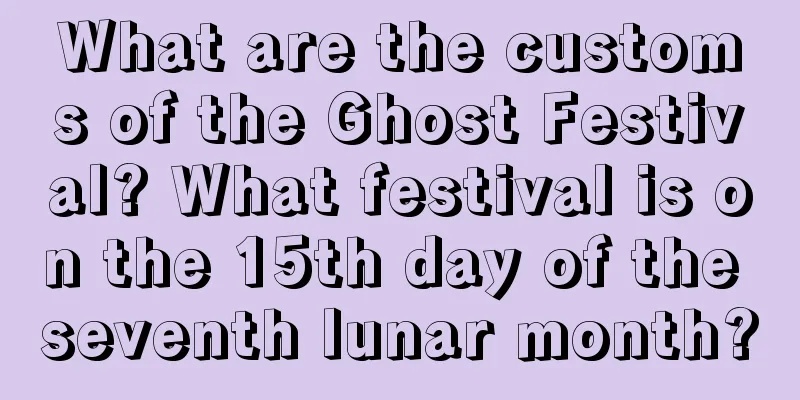What are the customs of the Ghost Festival? What festival is on the 15th day of the seventh lunar month?

Our country has been a traditional and ancient country since ancient times, and as a result, a wealth of traditional cultural festivals have emerged. Each festival has a specific time and its origin. So what are the customs of the Ghost Festival? What festival is on the 15th day of the seventh lunar month? Let’s take a look with the editor. The Ghost Festival is also called the Mid-Autumn Festival because it falls on the 15th day of the seventh lunar month. The Mid-Autumn Festival is an important traditional festival, which is usually celebrated by ancestor worship. Mr. Shui Mo has sorted out the relevant matters regarding ancestor worship on the Mid-Autumn Festival.What are the customs of the Ghost Festival?Hebei Province : In Botou City and Nanpi County, people go to their ancestors' tombs to pay homage on July 15th, carrying fruits, dried meat, wine, paper money, etc. And carrying hemp to the stalks of the fields is called "Jianxin". During the Ghost Festival in Guangping County, people worship their ancestors with fresh food, and prepare fruits, vegetables and steamed lamb to give to grandchildren, which is called "sending lamb." On the 15th day of the seventh month in Qinghe County, people would visit the graves to pay homage to their ancestors and give steamed sheep to their daughters.Shanxi Province : Scholars in Yonghe County offer sacrifices to Kuixing on this day. Shepherds in Changzi County slaughter sheep to worship gods during the Ghost Festival. It is said that this can increase sheep production. Meat was also given as gifts to relatives. Those who were poor and could not afford sheep would steam noodles in the shape of sheep instead. Farmers in Yangcheng County use wheat crumbs to make shapes of cats, tigers and grains and hold sacrifices in the fields, which is called "xingtian". During the Ghost Festival, people in Mayi County make children's shapes out of wheat flour, called "mianren", and give them to each other's relatives' children. Farmers in Xin County hang colorful paper on the stalks of the fields during the Ghost Festival. Henan Province : During the Zhongyuan Festival in Shangqiu County, paper flags are hung at the door, which is said to repel insects. Flying kites during the Ghost Festival in Mengjin County. On the 15th day of July in Yan County, people draw an ash circle in front of their doors and burn paper money inside the circle to worship their ancestors. Shandong Province : Fishermen in Changdao made small boats out of wooden boards and sorghum, and pasted a note on them saying "For use by ××" or for the tablets of those who drowned in the sea. They then loaded the boats with food, clothes, shoes and socks and other utensils, then lit candles and had married men put the boats into the sea. Every household in Zhanhua County collects hemp and fresh grass leaves to build a shed, called a "hemp house", in which they place their ancestral tablets for worship. Duling County calls the Zhongyuan Festival the "Pinching Zui Festival", and every family eats simple meals. Shaanxi Province : Lintong County burns paper to worship Magu on July 15th. During the Ghost Festival in Chenggu County, farmers have a drinking party called "Gua Chu". Farmers go to the fields on the morning of the Ghost Festival to pick the tallest and densest rice ears. Five-colored paper flags are hung, called "field flags". Jiangsu Province : Residents of Wu County fold ingots out of tin foil and burn them along the road during the Ghost Festival, which is called "making a connection with ghosts." A kind of paper ghost is popular in various parts of Yizheng County. It has a bowl lantern inside, and there are gamblers, drunkards, high-ranking officials, and so on. During the Ghost Festival in Yixing County, four boats are released into the river: one for the Yimakou ritual, one for carrying Buddhist nuns chanting the Buddha's name, one for burning tinfoil ingots, and one for releasing river lanterns. On this day, the villagers of Dong County eat flatbread, a kind of food made of flour and sugar in the shape of a dustpan. When releasing river lanterns in Shanghai, red, green and colorful paper lanterns are placed on the stern of the boat, which is called "Du Gu". Sichuan Province : In Sichuan Province, it is customary to burn paper money to worship ancestors during the Zhongyuan Festival. That is, a stack of paper money is put into a small envelope with the recipient's title and name, the number of envelopes received, the name of the person who burned the silk and the time written on it. It is said that the gates of hell close on July 15th, and every family must give gifts to orphans and children. In the Chengdu area, people make "flower plates" out of paper, put paper money and fruit offerings on them, hold them in their hands, and walk around the house chanting: "Dear friends, neighbors, former residents, the souls who are reluctant to go back, all the lonely ghosts, please get on the flower plate, I will send you back!" After saying this, they take the paper to burn it outside the house. Zhejiang Province : Jiashan County regards rain on the Ghost Festival as a sign of a good rice harvest. On the evening of the Ghost Festival, people in Tonglu County ring gongs and scatter rice on the fields, which is called "feeding the hungry ghosts." During the Ullambana Festival in eastern Zhejiang, 24 old ladies are invited to “walk the eight knots” while chanting sutras. In Tiantai, people eat "dumplings" during the Ghost Festival. The dumplings are similar to spring rolls. There is also the custom of setting up street lanterns, with six strong men forming a group: one person beats the gong, one person hits the gong, one person holds a lantern, one person scatters salt and rice along the way, one person places incense and candles along the way (inserted on a piece of sweet potato or taro), and one person places a piece of tofu and a rice ball along the way (placed on a large tree). There is also a sacrifice set up about every hundred steps. Jiangxi Province : People in Ji'an burn paper ingots during the Ghost Festival, but pregnant women are prohibited from folding paper ingots. It is said that the paper ingots folded by pregnant women cannot be taken by ghosts after being burned, and it is of no use to send them to the underworld. During the Yimakou ritual, the master threw buns and fruits to the audience. Legend has it that if a woman grabs a bun, she will have a child the following year. If the child grabs the bun, he will never be frightened in his life. In Anyuan County, people worship their ancestors by burning incense and making tea from July 12 onwards, and offering sacrifices in the morning and evening. On the fifteenth night, paper money is burned for offerings. Fujian Province : During the Ghost Festival in Yongfu County, married women must return home to worship their ancestors. In Fuzhou dialect, the Zhongyuan Festival is called the "Paper Clothes Burning Festival." A married daughter prepares her parents' clothes, robes and hutongs, puts them in a box, covers it with gauze, called a "gauze box", and sends it to her parents' home. There is a custom of universal salvation during the Zhongyuan Festival in central Fujian. It is held in both urban and rural areas, and the funds are collected from door to door. Even extremely poor families will try their best to raise funds to cope with the situation. There is a proverb that goes: "If you don't spend money on Pudu, the plague will be around the corner. If you don't work hard on Pudu, the dwarf will come to take over." During the Pudu ceremony, there are also performances by children's orchestras. Putian has customs such as "family sacrifice", "gongmare", "sending paper" and "golden cake". [4] Guangdong Province : The Yao people in Qujiang County worship their ancestors on the 15th day of the seventh month, and also worship the Dog-Headed King, with little boys and girls wearing colorful clothes and singing and dancing to thank the gods. The people of Guishan County regard July 14th as the Ghost Festival. It is said that because the Yuan army marched south that year, people celebrated the festival one day earlier in order to avoid the war. The Ghost Festival in Chenghai County is a festival to worship ancestors and the Kitchen God. During the Zhongyuan Festival in Deqing Prefecture, people wrap flour in winter leaves to make cakes called "jiaqiao" to worship their ancestors. In ancient Chaoyang County, when offering food to the orphans, wealthy families would buy plows, water wheels, and even girls from poor families, write their names on pieces of paper, and scatter the paper when offering food to the orphans. Those who cannot afford to buy farm tools or marry a wife can receive it with the receipt. Guangxi Zhuang Autonomous Region: People in Guilin area mostly regard the 14th day of July as Ghost Festival. The whole festival should start from July 7th to the night of July 14th. The process is to welcome the ancestors, send off the ancestors, and pay homage to the ancestors. Some places start to welcome the ancestors from July 7th, and some welcome the ancestors on July 13th, but July 7th also requires "gongfan" (that is, sacrifice). On the night of July 14th, the ancestors are sent off, and after the sacrifice before dinner, the ancestor sending ceremony is performed around 10 pm. At the same time, "wallets" with the names of ancestors (the number of generations of ancestors to be written on is different for each family) and the "wallets" of porters and road-leading kings, paper money and other items are burned at the intersection, and rice water and other ceremonies are sprinkled to send off the ancestors. The process is complicated and solemn, and it is the most complicated festival in the local rituals. It is a festival that the locals attach great importance to. Its importance is as important as the Mid-Autumn Festival, Qingming Festival and Dragon Boat Festival, except for the Spring Festival (in the local concept, the Lantern Festival is also the Spring Festival, including the Little New Year). The people of Yangshan regard July 14th as the Mulian Festival. They often kill ducks to offer sacrifices to their ancestors. On that day, no one walks on the road, which is called "hiding from ghosts." In Guangxi Province, the Ghost Festival is also known as the "Duck Festival". People believe that the dead can stand on ducks and travel freely between the world of the living and the world of the dead. There is also the custom of "burning bags", which usually involves offering sacrifices to ancestors first, and then burning clothes for wandering ghosts. The wine and food for ancestor worship must be placed in a flat dustpan, meaning that wild ghosts cannot snatch them away. Yunnan Province : Tengyue people burn buns after offering sacrifices to their ancestors, and then use a cucumber, carve it into a boat shape, called a "cucumber boat", and burn it together with the buns. Hunan Province : People in Shaoyang "welcome old guests" around the 12th day of the seventh lunar month, and burn paper packages and burn incense to worship their ancestors on the evening of the 15th day of the seventh lunar month, which is called "sending off old guests." Inside the paper bag is an inch thick paper money, with the ancestor's name written on the front of the paper bag, and the word "seal" must be written on the back after it is wrapped. On the night of the fifteenth day, the more packets are burned, the bigger the fire will be, which means the family will become more prosperous. Hubei Province : Around the 15th day of the seventh lunar month, people in Macheng slaughter livestock, invite their aunts from the same family to celebrate the festival together, and burn paper money to worship their deceased ancestors. On the day of the sacrifice, meat, white wine and steamed buns with rice are offered first. Bamboo chopsticks are placed evenly between the food and the rice. The lights are all turned on and words of concluding the sacrifice are spoken. The men in each family personally print and make paper money, burn the paper, and kneel down to worship their ancestors. Then the whole family had a feast. The festival can be held on any day between July 13th and 16th. What festival is on the 15th day of the seventh lunar month?The fifteenth day of the first lunar month is called the Shangyuan Festival, which is the Lantern Festival and has existed since ancient times; the fifteenth day of the seventh lunar month is called the Zhongyuan Festival, which is used to worship ancestors; the fifteenth day of the tenth lunar month is called the Xiayuan Festival, which is used to eat cold food and commemorate the wise. The Ghost Festival falls on the 15th day of the seventh lunar month, and on the 14th day of the seventh lunar month in some areas.The Zhongyuan Festival originally fell in the beginning of autumn, when some crops had matured. People would worship their ancestors according to custom, offering sacrifices such as new rice to report the harvest to their ancestors. Therefore, every Ghost Festival, every family worships their ancestors and performs offerings according to the rituals. On July 15th, people visit tombs and worship their ancestors. Overseas Chinese will send small amounts of money during the four festivals: Qingming, Zhongyuan, Winter Solstice and New Year's Day. Otherwise, they will be regarded as disrespectful to their ancestors, unfilial to their elders, irresponsible to their wives and good-for-nothings. Legend has it that on the day of the Ghost Festival, all ghosts will be released from the underworld, and people will generally hold activities to worship ghosts. Every family that has a new death must visit the new grave, and usually offer sacrifices to the wandering ghosts in the local area, making it one of the largest sacrificial festivals among the Chinese people. |
<<: What is the Ghost Festival? Is the Ghost Festival the Mid-Autumn Festival? Are the two related?
Recommend
What are the auspicious days for moving in the first month of 2019?
Choosing an auspicious day is a basic matter for a...
Introduction to the 2021 Year of the Ox Toast
Drinking is essential when visiting relatives and ...
Is October 21st of the lunar calendar in 2017 an auspicious day?
Introduction: Every day of the 365 days in a year ...
What is the date of April 15th in the lunar calendar in 2019? What day is it?
The beauty of April on earth has faded, and the p...
Which days in the sixth lunar month of 2020 are suitable for worshiping ancestors? What is the other name of the sixth lunar month?
Introduction: Generally, it is necessary to choose...
Is it a good day to move house on the 19th day of the 12th lunar month in 2020?
People usually choose a good time to move into a n...
What are the taboos on the sixth day of the second lunar month in 2019?
Spring is a great time full of vitality, with eve...
Can I get a haircut during the Grain Rain season in 2022? Recommended auspicious days for haircuts before and after Grain Rain
You also need to choose a good time to get a hairc...
Is it a good idea to pick up a new car on the tenth day of the sixth lunar month in 2018?
The sixth lunar month of 2018 also ushered in sum...
Is the fate of a girl born on the seventh day of the third lunar month in 2021 good? Will you become rich and powerful?
The fate of different girls is different. Some gir...
2018 Lunar August 13th Lunar Calendar Auspicious and Unlucky Query, Hour Auspicious and Unlucky Query
The eighth month of the lunar calendar is also ca...
Is the fourth day of the fourth lunar month in 2022 a good day? Where is the God of Wealth today?
The fourth month of the lunar calendar marks the b...
Can I build a house on the fourth day of the fifth lunar month in 2019? Is it auspicious to start construction on the fourth day of the fifth lunar month?
Introduction: Breaking ground to build a house is ...
Are people born on the 13th day of the first lunar month in 2018 destined to be rich?
Introduction: There are thirty days in a month, an...
Is it possible to have sex during the Beginning of Winter in 2017? Is it okay to have sex on the beginning of winter?
Introduction: Beginning of Winter is one of the 24...









